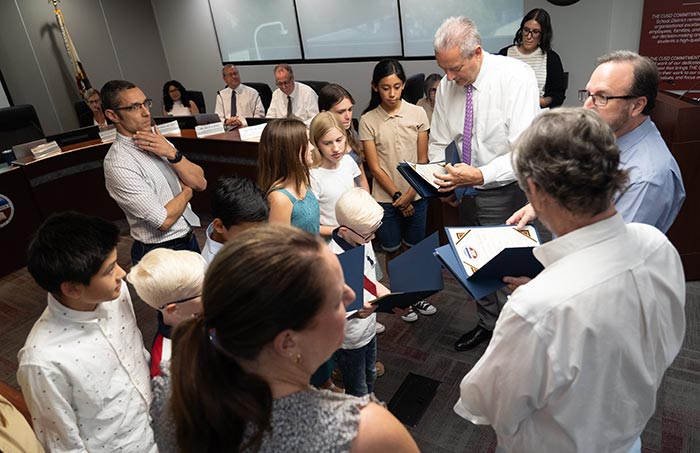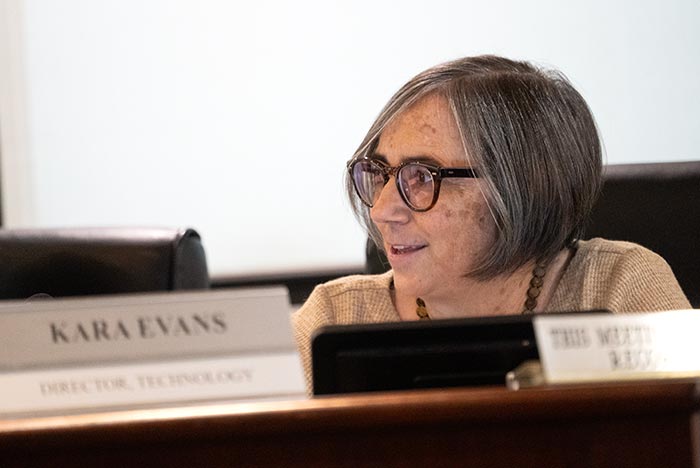CUSD Board looking at district student cell phone policies

At its September 5 meeting, CUSD’s Board of Education recognized students who competed at the recent USA Track and Field National Junior Olympic Championships, and El Roble students Thijmen Post and Marjorie Barndt for their success at the recent World Scholars’ Cup. Courier photo/Andrew Alonzo
by Andrew Alonzo | aalonzo@claremont-courier.com
Claremont Unified School District’s Board of Education engaged in a lively discussion about cell phone regulations on high school campuses during its September 5 meeting and explored potential next steps for crafting a districtwide policy on the issue.
The talk came three weeks after a call to action by California State Superintendent of Public Instruction Tony Thurmond requesting local educational agencies “join California’s statewide effort to restrict students’ cell phone use in schools.” The board’s discussion represented a first step in CUSD developing a districtwide cell phone policy. Currently, each school has its own policy.
Thurmond’s August 13 statement cited “evidence of harm to students’ mental health and well-being, as well as a correlation between smartphone addiction and negative impacts on learning and academic performance.”
“Last month, Governor [Gavin] Newsom and State Superintendent of Public Instruction Tony Thurmond called on school districts to restrict student’s use of cell phones while on campus,” CUSD Superintendent Jim Elsasser said at the meeting. “As you know, elementary and intermediate school students in Claremont Unified School District are not allowed to use their cell phones while on campus. Students at Claremont High School and San Antonio High School are allowed to use cell phones while on their respective campuses during certain times of the day.”
CHS’s new cell phone policy went into effect September 3. Principal James Mitchell said cell phone use is now permitted on campus before and after school, during passing periods, and at lunch. Students and teaching assistants must keep “all cell phones, headphones, [and] non-student issued electronic devices” in their backpacks during instructional periods. He clarified wearable technology such as smart watches are considered “non-student issued electronic devices.”
“Students who leave class during instructional periods with passes, for example restroom passes, will keep their cell phones within their backpacks,” Mitchell added. If a student is caught on their phone during an instructional period without staff permission, the phone is put into a sealed envelope, picked up by a proctor and delivered to CHS student services.
On their first offense students can pick their phone up from student services after school after a legal guardian has been notified of the infraction. A parent or guardian must retrieve the phone on the second violation and the student is assigned detention. For a third violation, detention and a meeting with administration is set. For a fourth violation and beyond, students will be assigned Saturday school. Board President Bob Fass asked Mitchell to provide data as to the number of multiple violations CHS sees under its new cell phone policy.
The policy builds off a framework developed at the end of the 2023-2024 school year that was recently approved by 77% CHS teachers, Mitchell said.
San Antonio High Principal Andrea Deligio said teachers have been collecting student cell phones and placing them in desktop organizers at the start of each period since spring 2024. This has led to students “not running to the restroom as much” and SAHS “seeing a reduced rate of students walking freely during instructional time,” Deligio said. “It’s been working. I’ve done a lot of observation in the last six days and the kids are really engaged. They’re focused on their education and on the assignments at that moment and they don’t have the distraction.”
A closer examination of San Antonio’s cell phone policy will take place at a future SAHS staff meeting.
“Currently though we decided it’s easier to start off the year strong and pull back if we need to,” Deligio said, adding any policy updates must meet the needs of the SAHS demographic: students who are recovering credits.
CUSD Board Clerk Richard O’Neill took issue at the allowance of phones during passing periods at CHS. Mitchell said the passing period allowance was discussed and ultimately accepted by staff. The CHS principal said teachers use the start of each class period to “reset” student’s attention after breaks.
Board members Kathy Archer and Alex McDonald praised both policies.
Fass later cautioned the district, “to be real mindful of how we’re using technology to drive the cell phone use,” contending if it allows cell phone use during passing periods and lunch, “we are forcing the activity into those moments and we’re probably encouraging it by allowing these moments of get on your device and see what’s going on. I don’t have a perfect solution to it, I’m just raising it as a dilemma because it strikes me that it could be exacerbating the problem.”

Kara Evans was named CUSD’s director of educational technology and innovation, at $189,018 per year plus a benefits package, at the September 5 Board of Education meeting. Courier photo/Andrew Alonzo
Board Vice President Kathryn Dunn said the California School Boards Association is opposed to a blanket statewide cell phone ban, and that CUSD must be careful when assessing what social media applications it utilizes to publicize school activities and announcements.
“You’re supposed to be 13 to be on Instagram so maybe, as a district, we need to look at if that’s a great forum for announcing school activities or whether it’s appropriate to ask seventh graders to get on an app that really they’re not legally allowed to be on,” Dunn wrote in an email to the Courier.
Though opposed to cell phone use during class, Dunn said she’s open to the possibility during other specified times, “particularly when we’re talking about special education students. They have different needs, different anxieties, pressures to escape. A child with autism may need to get on the phone to reset to go back into the classroom. So, I just want to make sure we’re working with the special ed department and making sure those kids aren’t being punished.”
Dunn also spoke to the good of wearable tech, which O’Neill said could be hard to monitor, as students with medical conditions can be alerted to oncoming issues. Dunn floated the idea of a “free zone” on campus where technology can be used. She also voiced concern that CUSD does not have earmarked funding for monitoring cell phone usage on campus. The funding picture could change if a cell phone ban becomes a state mandate, she said.
Fass requested an exception to the no cell phone rule “where there might be a medical or a social-emotional need” be crafted into the final policy. Fass and Dunn also requested a survey polling high school staff, families, and students be done and the data presented to the board before a final policy is brought up for a vote. CUSD spokesperson Elaine Kong wrote in an email Tuesday that “the survey aims to understand the community’s perspectives on the existing high school cell phone policies.
“The Board may also be provided with data on cell phone violations and the logistics of communication between staff and students,” Kong added. “While the Board did not direct the creation of a districtwide cell phone and electronics use policy at this time, the feedback gathered from the survey and additional information may help inform future decisions.”
The board also passed the following items at the meeting, all by unanimous 5-0 votes:
- The reassignment of Kara Evans from coordinator II, educational technology, to director III, educational technology and innovation, effective August 20. Evans’ new yearly salary is $189,018, up from her previous position, for which she was paid $167,922.
- Approval of a new job description, “Director III Educational Technology and Innovation.” The “position has been created to meet the current and future needs of students, staff, and families of CUSD,” according to the agenda.
- Approval of a salary schedule for the new position.
- The August 15 meeting minutes.
- The approval of the consent calendar.
The next CUSD Board of Education meeting is at 6 p.m. Thursday, September 19, at 170 W. San Jose Ave., Claremont.







0 Comments